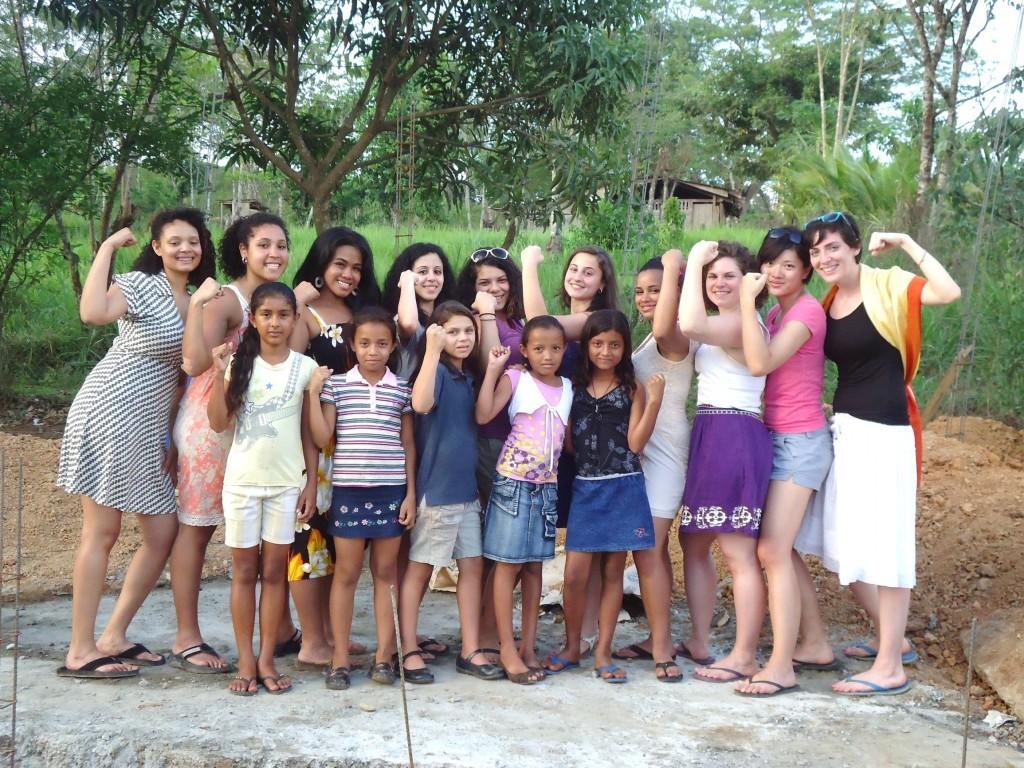Si Se Puede: Building a Foundation in Fonseca
August 3, 2011

This past spring break, I traded in margaritas and white sand beaches for bat-infested latrines and no running water. Along with nine other girls from my Global Outreach team, I traveled to the northeast autonomous region of Nicaragua. We volunteer with the organization Bridges to Community, which is a nonprofit service program that works with underdeveloped areas in Nicaragua. The trip was nothing like I expected (and I’d be lying if I said I wasn’t freaking out for the first few days) but after everything we accomplished, I would not change one second of it.
Our group had an interesting dynamic. With three Dominicans, two Asians, two Italians, a Puerto Rican, a Jew and a Moroccan, we were not lacking in personality. And to top it off, we were all hormonal females.
We flew to Managua, took a horrifyingly tiny jet to Siuna, and then an hour-long bumpy truck ride to the community of Fonseca. After processing the fact that we had no bathroom, shower or communication to the outside world, we dove, head first, into the experience.
We showed up to the work site with our “Yo Soy Feminista” T-shirts only to be greeted with laughter. Women are not supposed to be “working” alongside the men. And these weren’t even all men; boys as young as 13 were working with the contractors.
It didn’t matter what they thought of us as “gringos.” We were there to work. The man in charge, Don Luis, explained to us how to make the metal foundation for the school and we were off. We dug out the perimeter of the school, inserted the metal foundation, and covered it with cement, which we had to mix by shovel. By the end of the week, the men started treating us with the same respect they did each other.
There were a lot of firsts during this trip. We were the first group from Fordham to travel to this part of Nicaragua, the first group from Fordham to work with Bridges to Community, and the first group to begin working on the new school in Fonseca. We were also the first group to ask for a woman’s voice in that society.
After working all day, we wanted to meet with the women of the community so we could focus on our intended goal of the trip: women’s rights in the developing world. We were ready for a stimulating dialogue about oppression and the fight for equality, but were unpleasantly surprised by the response we got. The people living in Fonseca couldn’t understand at first why we were even interested in speaking with the women of the community. This was not something they were accustomed to. Probably writing us off as crazy Americans, they agreed to come by where we were staying one evening.
The scene could not have been crafted any more startlingly if we tried. The women sat on benches with us, while their husbands stood behind them with their arms crossed. One woman began talking about how perfect her marriage is, and how well her husband treats her. Not to our surprise, but someone then pointed out the woman’s husband standing directly behind her. We were in awe of the hold the men had over their wives and how differently they perceived the world.
After that meeting, more women came to where we were staying because they wanted to speak up. We felt for the first time that we were actually making a difference. We were starting the conversation about women roles in Nicaraguan society. The foundation for a woman’s voice was set.
The main issue we found in speaking with the people of Fonseca and Siuna is not that there is no protective legislation for women. There are actually many laws in favor of women’s rights and maintaining their safety. It’s the overwhelming “machismo” mentality that prevents women from utilizing the laws available to them. If a women goes to town and reports that her husband abuses her, she needs to be aware that she may never be able to return to her home out of fear for the consequences that come along it. Even if a lawsuit is in place, men easily pay off lawyers to settle the case before it can even go to court.
Although we were only in Fonseca for one week, our efforts will hopefully reverberate throughout the community for years to come. Women now know that they have a voice, and more importantly, people want to hear what they have to say. We asked the members of Bridges to Community to continue to allow the women of Fonseca to speak to the different Fordham groups that continue to visit. Now that the conversation has begun, there’s no telling where these women will stand in the next decade.
We may have set the foundation for the new school, but we broke more ground than just soil. The foundation for a new role for women in Fonseca has been set, and it is up to those that follow us to carry on the mission.








